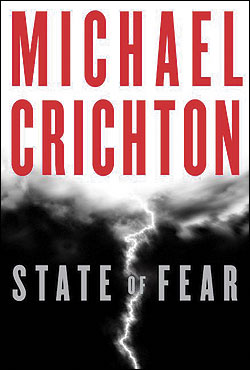Michael Crichton’s menaces have a way of going up in smoke as soon as he makes them the stuff of would-be thrillers. No sooner does he write of killer apes warring against humans than humans start eating real apes into oblivion. No sooner does he give us test-tube dinosaurs cloned from prehistoric DNA than the real-world hoopla about reviving lost species proves to be hollow hype. And no sooner does he portray Japan as an invincible economic juggernaut than it collapses into unending recession.
Now, in State of Fear (HarperCollins, $27.95), Crichton has pointed his pulp powers at an even greater threat to civilization: environmentalists. His premise: A mainstream green group, the National Environmental Resource Fund, sponsors a radical one (the Earth Liberation Front) in executing an apocalyptic nonprofit Wag the Dog. Hence a series of weather disasters that will make the world quake over global warming and kick off NERF’s “Conference on Abrupt Climate Change” (“abrupt” being a notion Crichton seems to have borrowed from The Day After Tomorrow, not any actual scientific claims). The eco-terrorists first use lightning boosters to produce flash floods in Arizona. Next, if Crichton’s heroes (the usual motley band, jetting around the globe in the usual cliff-hanger chase) can’t stop them, they’ll set off an underwater landslide in the South Pacific, triggering a tsunami that will strike Los Angeles just in time for the nightly news. Then they’ll do Atlantic hurricanes. Film at 11.
Crichton’s timing is uncanny. Just as State of Fear appeared in December, so did the mother of all real-life tsunamis. But neither environmentalists nor anyone else tied it to global warming; in the real world, as opposed to Crichtonland, people know the difference between climate and earthquakes. And contrary to his assertions, greenhouse hysteria is not what drives the news cycle. Even when four rapid-fire Florida hurricanes—amidst a presidential contest between candidates whose clearest differences were environmental— provided a vivid foretaste of climatic disruption, neither John Kerry nor the news dared make mention.
The media-op tsunami is just one of Crichton’s many nonsensical contrivances. NERF and the Pacific atoll nation “Vanutu” sue the U.S. Environmental Protection Agency over rising seas, a strategy akin to suing the monorail authority for causing traffic congestion. The EPA may be ineffective and irrelevant (Bush dismissed its report affirming human-caused climate change as “what the bureaucracy says”), but it’s hardly the motive agent. When Crichton’s ELFers, who otherwise have no qualms about using efficient technologies, undertake a stealthy murder, they do it—again, I am not making this up—by holding a fatally venomous and unusually cooperative blue-ring octopus to the victim’s neck. When his heroes zip to the Solomon Islands to stop the eco-doomsday machine, they must fight their way through machine-gun-wielding cannibals trying to slice off pieces of their flesh—the greenies’ natural buddies, inserted like the octopus to show how nasty the state of nature is.
THE BOOK’S HOKUM quotient is a wonderful thing, ranking with the best old movie serials and later James Bond movies. And it might have been as amusing as those models, if its author were having fun. But its glints of humor total two: that “NERF” acronym and a BMW dealer whose sales go up after parishioners from the church next door harangue his salesmen over what Jesus would drive. Otherwise, Crichton is dead (and deadeningly) serious through all 603 pages—many of them footnoted and 21 of them constituting an annotated bibliography, the best reading in the novel. I’m all for footnotes and bibliographies in thrillers that present, or pretend to present, fact. But these notes are more window dressing than real help, full of dubious sources and sweeping, dubious assertions: Didja know that the boards of “all modern environmental groups” are packed with “industry figures”?
Much of State of Fear is a pseudo-dialogue in thriller guise, expressing what Crichton, in a tendentious “Author’s Message,” calls “many divergent views.” But it’s all straw-dog setup. The global-warming debunkers are brave, wise, and encyclopedically informed; one is Sherlock Holmes, Socrates, Mr. Spock, and Indiana Jones rolled into one. Their foils are blitherers and Hollywood airheads who make Dr. Watson look brilliant.
Trouble is, for all his passionate conviction, Crichton doesn’t know what he means to say. His “Message” first asserts that future generations “will be much richer than we are [and] enjoy more wilderness than we have today,” then declares, “I wish natural environments to be preserved for future generations. I am not satisfied they will be preserved in sufficient quantities, or with sufficient skill.” All he knows for sure is that global warming’s a crock, environmentalists are media-whoring scum, and the “PLM” (political-legal-media complex) conspires to trap us in a “state of fear” with phony threats. But for Crichton, amazingly, this supine, paranoid state has nothing to do with the Axis of Evil, the War on Terror, the Patriot Act, WMD, or John Ashcroft’s “phantoms of lost liberty.” You gotta wonder what planet he’s living on, and what the weather’s like there.








